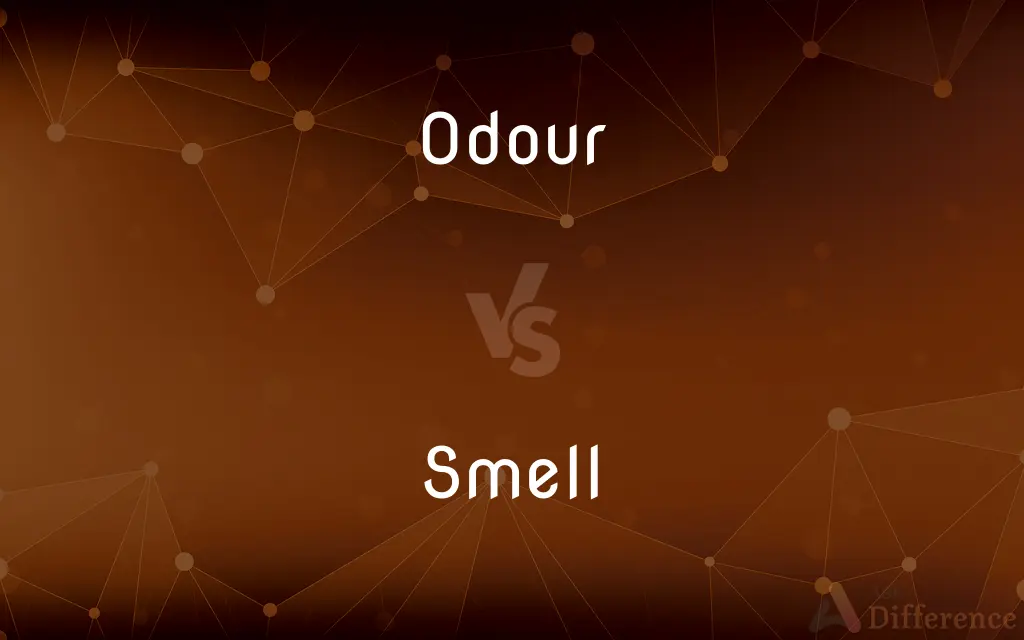Odour vs. Smell — What's the Difference?
By Tayyaba Rehman & Maham Liaqat — Updated on April 26, 2024
"Odour" often refers to a distinctive or characteristic smell, usually unpleasant; "smell" is a more general term for the sensation of detecting odours through the nose.

Difference Between Odour and Smell
Table of Contents
ADVERTISEMENT
Key Differences
Odour typically implies a specific, often strong or unpleasant smell, while smell refers broadly to any scent or aroma, whether pleasant, neutral, or offensive.
The term odour is often used in contexts where the focus is on the quality and nature of the smell, whereas smell can refer to both the act of smelling and the general odour something emits.
Odour often carries a negative connotation, suggesting something stale, noxious, or pungent, on the other hand, smell can describe a wide range of scents from the delightful fragrance of flowers to the foul stench of decay.
In scientific and formal contexts, odour is used to describe a distinct property of substances that is sensed by the olfactory system; smell, however, can also refer to the ability or action of perceiving odours.
When discussing pollution or hygiene, the term odour is frequently employed to emphasize an undesirable scent, while smell might be used more broadly in everyday language to include both detection and the quality of the air around us.
ADVERTISEMENT
Comparison Chart
Connotation
Often unpleasant or specific
Neutral, can be pleasant or unpleasant
Usage Context
Specific quality of a scent, often negative
Broad, includes the act of sensing odours
Emotional Load
Generally negative
Varies, more neutral
Example
"The odour of rotten eggs filled the room."
"I love the smell of coffee in the morning."
Application
More formal, technical
General, everyday use
Compare with Definitions
Odour
A distinctive smell, especially an unpleasant one.
The odour of spoiled food is hard to miss.
Smell
A particular quality, sensation, or scent that something emits.
The smell of freshly baked bread is irresistible.
Odour
A quality of something that is perceived by the sense of smell.
The odour of sanctity is a term from Christian theology.
Smell
To emit a scent, often specified.
This flower smells sweet.
Odour
A sustained and noticeable smell.
The odour of incense can be soothing.
Smell
To have a suggestion or trace of something.
The plan smells of genius.
Odour
Any pervasive or noticeable scent.
A sweet floral odour filled the greenhouse.
Smell
The sense, located in the nasal cavities of mammals and relying on the olfactory nerves, by which molecules borne in a fluid such as air can be perceived; the olfactory sense.
Odour
An indication or a trace of something.
There was an odour of discontent among the employees.
Smell
A similar sense in other animals, as insects' ability to perceive air-borne molecules with their antennae.
Odour
A distinctive smell, especially an unpleasant one
The odour of cigarette smoke
Smell
The act or an instance of smelling
Got a smell of the pie.
Odour
A lingering quality or impression attaching to something
An odour of suspicion
Smell
A quality of something that is perceived by the sense of smell; an odor
The smell of a barn.
Odour
Variant of odor.
Smell
A distinctive enveloping or characterizing quality; an aura or trace
The smell of success.
Odour
(British spelling) odor
Smell
To perceive (an odor) by the sense of smell.
Odour
The sensation that results when olfactory receptors in the nose are stimulated by particular chemicals in gaseous form;
She loved the smell of roses
Smell
To perceive or detect (something) by a chemosensory organ, such as an antenna.
Odour
Any property detected by the olfactory system
Smell
To inhale the air near (something); sniff
Smiled as she smelled the rose.
Smell
To detect or discover, as by intuition or inference
We smelled trouble ahead. The committee tried to smell out corruption in law enforcement.
Smell
To use the sense of smell.
Smell
To sniff
The dog was smelling around the bed.
Smell
To have or emit an odor
"The breeze smelled exactly like Vouvray—flowery, with a hint of mothballs underneath" (Anne Tyler).
Smell
To have or emit an unpleasant odor; stink
This closet smells.
Smell
To be suggestive; have a touch of something
A remark that smells of sanctimony.
Smell
To appear to be dishonest or corrupt
The political situation is starting to smell.
Smell
A sensation, pleasant or unpleasant, detected by inhaling air (or, the case of water-breathing animals, water) carrying airborne molecules of a substance.
I love the smell of fresh bread.
Smell
(physiology) The sense that detects odours.
Smell
(transitive) To sense a smell or smells.
I can smell fresh bread.
Smell the milk and tell me whether it's gone off.
Smell
Followed by like or of if descriptive: to have a particular smell, whether good or bad.
The roses smell lovely.
Her feet smell of cheese.
The drunkard smelt like a brewery.
Smell
To smell bad; to stink.
Ew, this stuff smells.
Smell
To have a particular tincture or smack of any quality; to savour.
A report smells of calumny.
Smell
To detect or perceive; often with out.
Smell
(obsolete) To give heed to.
Smell
(transitive) To smell of; to have a smell of
Smell
To perceive by the olfactory nerves, or organs of smell; to have a sensation of, excited through the nasal organs when affected by the appropriate materials or qualities; to obtain the scent of; as, to smell a rose; to smell perfumes.
Smell
To detect or perceive, as if by the sense of smell; to scent out; - often with out.
Can you smell him out by that?
Smell
To give heed to.
From that time forward I began to smellthe Word of God, and forsook the school doctors.
Smell
To affect the olfactory nerves; to have an odor or scent; - often followed by of; as, to smell of smoke, or of musk.
Smell
To have a particular tincture or smack of any quality; to savor; as, a report smells of calumny.
Praises in an enemy are superfluous, or smell of craft.
Smell
To exercise the sense of smell.
Smell
To exercise sagacity.
Smell
The sense or faculty by which certain qualities of bodies are perceived through the instrumentally of the olfactory nerves. See Sense.
Smell
The quality of any thing or substance, or emanation therefrom, which affects the olfactory organs; odor; scent; fragrance; perfume; as, the smell of mint.
Breathing the smell of field and grove.
That which, above all others, yields the sweetest smell in the air, is the violent.
Smell
The sensation that results when olfactory receptors in the nose are stimulated by particular chemicals in gaseous form;
She loved the smell of roses
Smell
Any property detected by the olfactory system
Smell
The general atmosphere of a place or situation and the effect that it has on people;
The feel of the city excited him
A clergyman improved the tone of the meeting
It had the smell of treason
Smell
The faculty of smell
Smell
The act of perceiving the odor of something
Smell
Inhale the odor of; perceive by the olfactory sense
Smell
Emit an odor;
The soup smells good
Smell
Smell bad;
He rarely washes, and he smells
Smell
The faculty or power of perceiving odours.
Dogs have an acute sense of smell.
Smell
To detect or perceive odours.
He can smell rain coming long before it arrives.
Common Curiosities
What is the difference between odour and smell?
Odour often refers to a specific, usually unpleasant smell, while smell is a broader term that encompasses all types of scents.
How do scientists use the term odour?
In scientific contexts, odour specifically refers to the property of a substance that elicits an olfactory response.
Which term is more formal, odour or smell?
Odour is generally considered more formal than smell.
Can people lose their sense of smell?
Yes, conditions like anosmia involve the loss of the ability to detect odours.
What does it mean when something has no smell?
It means it does not emit a detectable scent or odour.
Why might someone say a place has a bad odour?
This usually indicates that the place has a strong, unpleasant smell, often due to decay or lack of cleanliness.
Is smell always about unpleasant odours?
No, smell can refer to any scent, whether pleasant, neutral, or unpleasant.
What is an odour neutralizer?
It is a product designed to eliminate or mask odours, rather than just covering them up with fragrances.
Can odour be positive?
Typically, odour refers to unpleasant smells, but it can sometimes be used neutrally or less commonly, positively.
What are some common causes of bad odours in homes?
Common causes include garbage, mold, stagnant water, and unclean bathrooms or kitchens.
Share Your Discovery

Previous Comparison
Job vs. Profession
Next Comparison
Redundance vs. RedundancyAuthor Spotlight
Written by
Tayyaba RehmanTayyaba Rehman is a distinguished writer, currently serving as a primary contributor to askdifference.com. As a researcher in semantics and etymology, Tayyaba's passion for the complexity of languages and their distinctions has found a perfect home on the platform. Tayyaba delves into the intricacies of language, distinguishing between commonly confused words and phrases, thereby providing clarity for readers worldwide.
Co-written by
Maham Liaqat















































